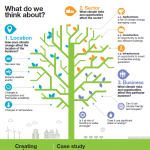Climate change is a severe and growing threat to poverty reduction and development in Africa and Asia. It is affecting people’s livelihoods, businesses and economic growth.
In Africa, the average annual temperature is expected to increase by 2°C by 2100 and rainfall levels are expected to fall. And the situation in Asia is just as challenging, with the region already witnessing increases in average and extreme temperatures, changing patterns of rainfall, and a rise in sea level. The combination of these changes threatens food and water supplies, and puts infrastructure, businesses, homes and human health at risk.
CDC is the UK’s development finance institution. We are owned by the UK Government, and we invest in businesses in Africa and South Asia to create jobs and make a lasting difference to people’s lives in some of the world’s poorest places.
Given CDC’s focus on Africa and South Asia, and the climate challenges facing both regions, it is important that we support businesses to address these challenges. Private sector investment can help businesses become resilient to immediate risks to their survival such as flooding or water shortage. But it can also go further than this, in supporting businesses to adopt climate-friendly initiatives and renewable-energy generation.

change to help businesses grow
CDC’s recently published climate change policy is supporting us to do both. Before we invest in a business, we carefully consider how climate change affects its location; the industry sector we’re investing in; and the specific climate risks and opportunities faced by the business in question. This helps us to agree an action plan before we invest, both to tackle risks but also maximise opportunities.
One way we’re putting our policy into action is through efforts to incorporate energy efficiency, on-site renewable energy, disaster risk management and water management in investments that include construction and real-estate development.
What does this involve? Firstly, we work with businesses to ensure that new developments – whether these include hospitals, warehouses, residential buildings, or office blocks – are built to international green design standards. A recent example is our investment in a mixed-use development in Nairobi, Kenya. The development has installed a solar panel-covered car park canopy, the largest real-estate solar panel installation in Africa. The solar panels will deliver significant energy cost savings for property managers and occupants, but also reduce pressure on public utility supplies and reduce carbon emissions.
Secondly, when we invest in businesses that own and operate existing buildings, we support them to identify water and energy-efficiency measures to reduce consumption and costs. For example, we are currently working with two Indian hospital chains in this area. Hospitals are understandably large consumers of water and energy. We are supporting these hospital chains to harvest rainwater and reuse water for non-medical purposes; and to commission energy audits to demonstrate the savings from implementing energy-efficiency measures. A reduction in energy consumption per occupied bed not only saves on electricity bills but also reduces a hospital’s carbon footprint.
Through this kind of support, we can help the businesses we invest in to become sustainable. Only by tackling climate change issues now can these businesses ensure they are around for the long-term, and that they continue to grow and provide jobs.
1 comment
Comment by Oliver Harwood posted on
so its OK to subsidise Africa but to put thousands of UK renewable workers out of work? shame on you.